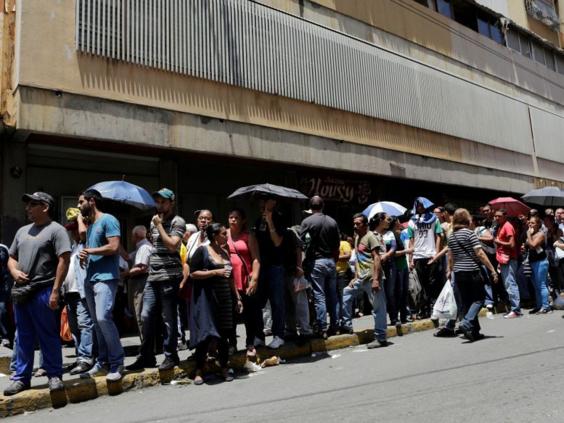
It has already asked women to stop blow-drying their hair and given a two-day working week to public sector workers, now the scale of the financial crisis propelling Venezuela towards economic ruin can be seen in how much it costs to eat a humble hamburger.
The official exchange rate is now at a rate of 10 bolivares for $1 as the country continues to be gripped by a currency crisis caused by the fall in the global oil price and the economic mismanagement of President Nicolas Maduro’s government.
That means the hamburgers being sold for 1,700 Venezuelan dollars as reported by the AFP news agency will set customers back $170.
It means even the middle classes are struggling to afford the most basic necessities.
According to the International Monetary Fund, inflation is now at 720 per cent as people in the capital are forced to spend long hours queuing for basic foodstuffs in the country’s cities.
One person standing a queue for daily deliveries of basic toiletries such as toothpaste in the capital, Caracas, told Agence France Presse he wasn’t even sure what he would be able to buy.
He said: "We do this every week. And we don't know what we're trying to buy.
"What's frustrating is when you get into a gigantic line but they run out before you get any."
Mr Maduro has been raising the minimum wage in a bid to help workers keep up with inflation.
Earlier this month he announced a 30 per cent increase in the wage to 15,051 bolivares a month (£1042.60) after a 25 per cent increase at the beginning of March.
Experts warn that Venezuela is on the brink of economic collapse as it suffers from an electricity crisis at the same time.
Last month, the government announced measures including abandoning a half an hour timezone jump put in place by former President Hugo Chavez to save electricity in the evening; restricting public sector workers to a two-day working week; and asking Venezuelan women to stop blowing drying their hair.
A petition calling for Mr Maduro to be ousted reached over 2 million signatures within a week of it being launched by the country’s opposition leaders and has cleared the first hurdle in the process to remove him from office.
The petition has to gather one per cent of eligible voters to be valid.
A further 20 per cent have to agree for a recall election and Mr Maduro’s opponents must win more votes than he received in the initial election in 2013 (just under 51 per cent).








